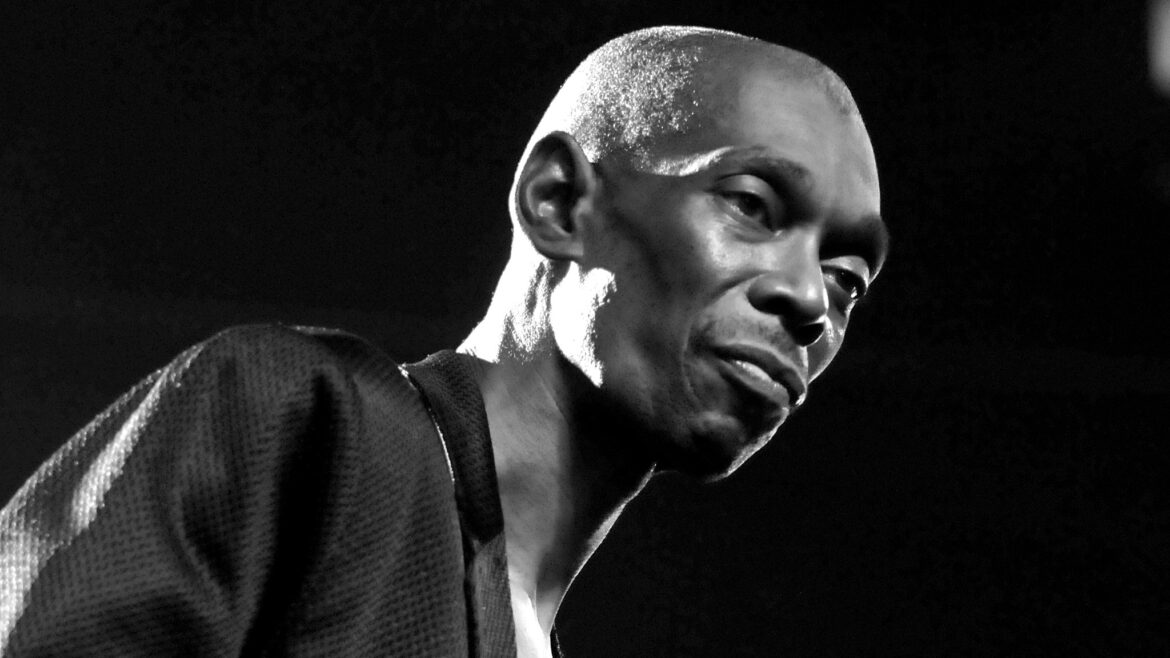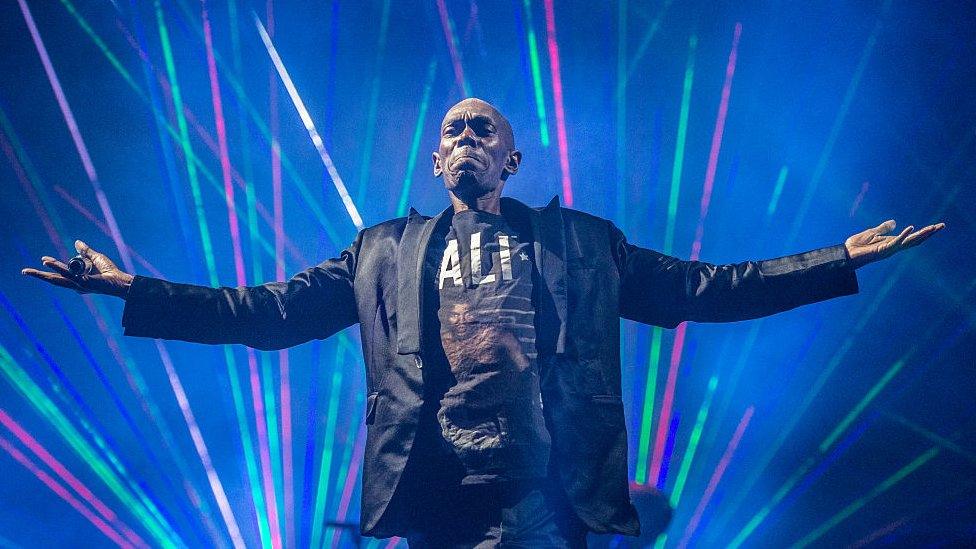
Maxi Jazz: A Life in Music and Spirituality
Maxi Jazz, born Maxwell Fraser on June 14, 1957, was a British musician, rapper, singer, songwriter, and DJ, best known as the lead vocalist of the influential British electronic music band Faithless. His deep, resonant voice, philosophical lyrics, and charismatic stage presence became iconic in the world of electronic and dance music.
Maxi Jazz was more than just a performer; he was a spiritual figure, an artist deeply rooted in mindfulness, and a human being who sought to inspire through his words and music. His career, which spanned several decades, left an indelible mark on the global music scene, particularly during his time with Faithless from 1995 to 2011 and later again from 2015 to 2016. On December 23, 2022, the world lost this remarkable figure, but his legacy continues to resonate with fans worldwide.
Early Life and Musical Beginnings
Maxi Jazz was born in Brixton, South London, to a Jamaican family. He grew up during a time of significant social and political change, with the vibrancy of Brixton’s multicultural community serving as a backdrop to his formative years. Music was a major part of his early life, with influences ranging from reggae and soul to funk and punk. As a teenager, he immersed himself in the emerging hip-hop and dance music scenes that were growing in London during the late 1970s and early 1980s.
His journey into music began as a DJ in pirate radio, where he spun records for small underground stations. It was during this time that he started to develop his skills as a rapper and lyricist. His passion for music and spirituality began to intertwine as he explored various philosophies and teachings. Jazz was heavily influenced by the writings of the Indian guru Paramahansa Yogananda, whose book Autobiography of a Yogi had a profound impact on his outlook on life. This spiritual foundation would later become a defining aspect of his music, particularly with Faithless.
Maxi Jazz formed his own sound system in the mid-1980s, known as The Soul Food Cafe System. This project was a blend of hip-hop, soul, and reggae influences and allowed Jazz to experiment with different musical styles while honing his skills as a performer. By the early 1990s, he had become a well-known figure in the London club scene, which would eventually lead to his most significant musical partnership.
Faithless: A Breakthrough in Electronic Music
In 1995, Maxi Jazz was approached by producers Rollo Armstrong and Sister Bliss to join a new electronic music project they were forming, which would eventually become Faithless. This collaboration proved to be one of the most important of Jazz’s career, propelling him to international fame. The group’s unique blend of house, trip-hop, and trance music, combined with Jazz’s deeply introspective and often spiritual lyrics, set Faithless apart from other electronic acts of the time.
.
.
The release of Faithless‘ debut album, Reverence, in 1996 marked the beginning of the band’s global success. Tracks like “Insomnia” and “Salva Mea” became anthems in the electronic music world, and Maxi Jazz’s vocals were central to the band’s identity. His distinctive voice, calm yet commanding, delivered lyrics that were often philosophical, exploring themes of faith, existentialism, love, and social justice. “Insomnia” in particular became one of the most iconic dance tracks of all time, with Jazz’s famous opening line “I can’t get no sleep” becoming a mantra for night-time ravers around the world.
One of the unique aspects of Faithless was their ability to fuse dance music with thoughtful, and sometimes political, lyricism. Maxi Jazz’s contribution as a lyricist and vocalist was crucial to this. While much of the dance music of the 1990s focused on hedonism and escapism, Faithless offered a more introspective and socially conscious alternative. Tracks like “God Is a DJ,” from their second album Sunday 8PM (1998), emphasized the redemptive power of music, with Jazz rapping: “This is my church, this is where I heal my hurts.” His belief in the power of music as a spiritual experience was evident throughout his work with the band.
Themes and Lyrics
Maxi Jazz’s lyrics often revolved around themes of inner struggle, faith, and the search for meaning in a complex world. His introspective writing reflected his personal spiritual journey, which included Buddhism and a deep interest in meditation and mindfulness. He often used his platform to explore these deeper existential questions, making him an outlier in a genre often associated with superficial themes. Songs like “We Come 1” from the album Outrospective (2001) underscored the importance of unity and collective human experience, while “Muhammad Ali” (from the same album) celebrated one of Jazz’s personal heroes and the idea of personal excellence and spiritual strength.
Jazz’s approach to songwriting was unique in that he combined the energy of rap with the meditative qualities of poetry. His voice was never hurried, even when delivering rapid-fire lines, which lent his performances a calm gravitas. There was always a sense of intentionality behind his words; every lyric seemed carefully chosen to provoke thought or inspire reflection. This quality gave Faithless a rare emotional depth, which resonated deeply with their fans.
Maxi Jazz often spoke about the importance of balance in life, both in his lyrics and interviews. He believed in the interconnectedness of all things, and this belief was reflected in his music. He saw music as a way to bridge divides, whether they were cultural, spiritual, or political. This message of unity was particularly important in songs like “Mass Destruction” (2004), which critiqued the Iraq War and the political climate of the time, calling for peace and understanding in the face of conflict.
Beyond Faithless: Solo Projects and Collaborations
After leaving Faithless in 2011, Maxi Jazz continued to pursue music through solo projects and collaborations. In 2006, during his time with Faithless, he had already begun working with a new band, Maxi Jazz & The E-Type Boys. This group allowed him to explore different musical styles, blending elements of funk, soul, jazz, and reggae into a unique sound that differed from his electronic music roots. The E-Type Boys was more organic, with live instrumentation and a focus on Jazz’s vocal delivery rather than electronic beats.
Jazz was also an avid collaborator, working with a range of artists from different genres. His collaborations included work with the British DJ and producer Tiësto, British rapper Example, and others, showcasing his versatility as an artist. Despite these ventures, Maxi Jazz remained closely associated with Faithless, returning for a brief period in 2015 for the band’s 20th-anniversary tour.
Spirituality and Activism
Maxi Jazz’s spirituality was not only central to his music but also to his life. He was a devout practitioner of Nichiren Buddhism, a Japanese form of Buddhism focused on chanting and mindfulness. Jazz often spoke about how his spiritual practice helped him navigate the challenges of fame, and how it informed his worldview. His belief in karma, meditation, and self-reflection was evident in his calm demeanor and philosophical lyrics.
.

.
Jazz was also politically active, often using his platform to speak out against injustice. He was particularly vocal about issues related to peace, anti-war movements, and social inequality. His opposition to the Iraq War and his advocacy for environmental causes made him a respected figure in both the music industry and activist circles. He saw his music as a tool for positive change and used his influence to promote messages of peace and unity.
Legacy
Maxi Jazz’s contributions to music, particularly through his work with Faithless, cannot be overstated. He helped redefine what electronic music could be, infusing it with a sense of spirituality and introspection that was rare in the genre. His calm, reflective voice and deeply philosophical lyrics made him a unique presence in the music world.
His passing on December 23, 2022, marked the end of an era, but his music continues to inspire. Faithless’s songs remain anthems for both club-goers and those seeking deeper meaning in life. Maxi Jazz’s influence can be seen in the generations of musicians who have followed, many of whom cite his work as an inspiration.
In the end, Maxi Jazz was more than just a musician. He was a spiritual guide, a philosopher, and an advocate for peace. His music, much like his life, was a journey toward understanding, unity, and love. His legacy will continue to resonate with those who find solace, inspiration, and meaning in his words and music.
Check out Maxi Jazz on Amazon.
Check out Faithless on Amazon.
Check out Maxi Jazz & The E-Type Boys on Amazon.
If you found this interesting please share it with friends and family, and why not read some of our other articles on Musicians who died in 2022.
.

